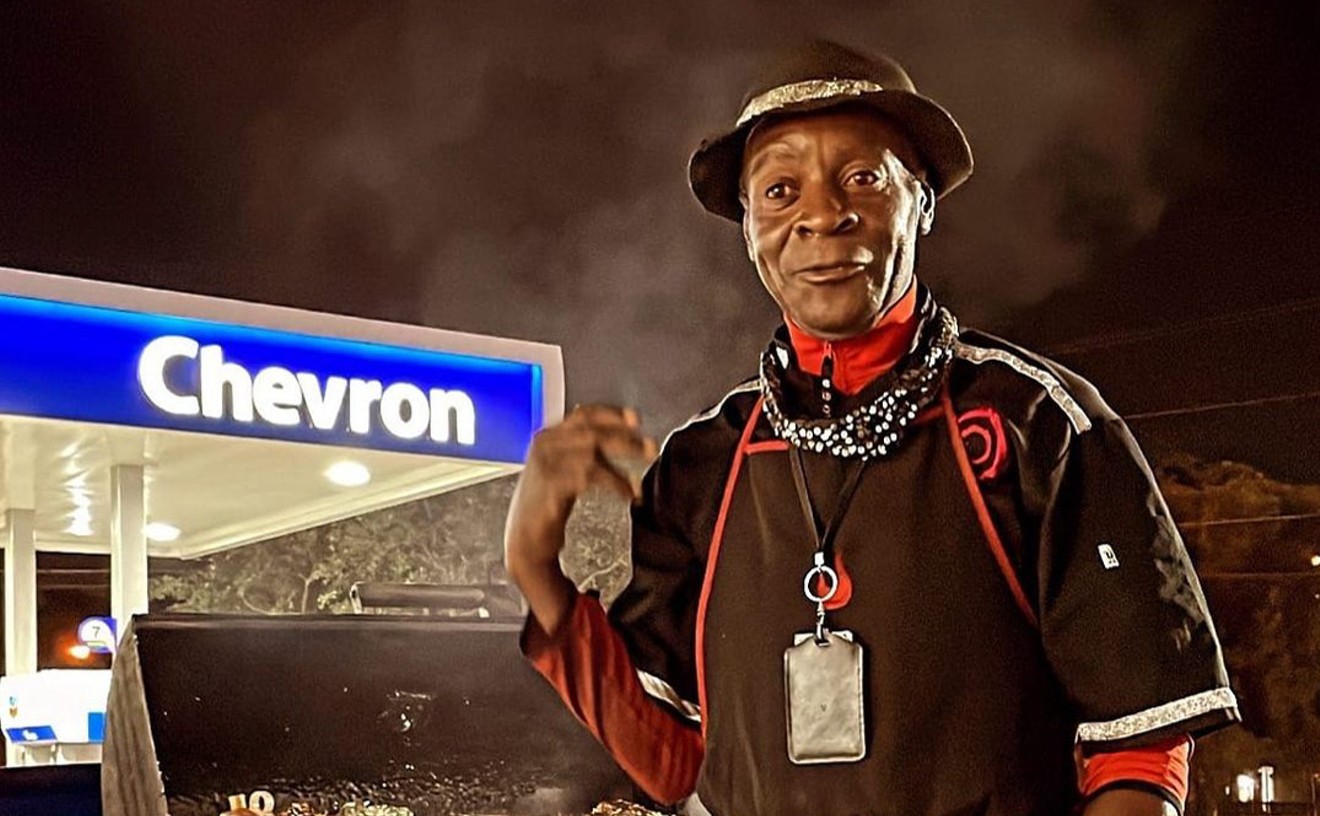The wisdom of the Academy can be assessed on February 13, when it announces its nominees. The inclusion of Sir Ian McKellen on that list--for his enthralling performance as the lead in Richard III, which opens in Dallas Friday--may well be the litmus test for whether the Oscar stands for anything other than the Almighty Dollar.
Sure, last year the Academy nominated Nigel Hawthorne (playing King George III), mostly for his touching reading of a passage from King Lear. But this time it's different: McKellen doesn't deserve a nomination as some vague life-achievement nod, or for handling a single passage from Shakespeare well, but for giving the hands-down best performance by any actor last year. The Academy, in other words, can't be vindicated just by nominating him. He must win.
"In the theatre we don't talk about awards at all," says McKellen in a lilting British accent. "When they suddenly happen, you go, 'Oh! I've been nominated,' or, 'Oh! I haven't.' But Oscars?! My God, people start talking about them before you've shot a foot of film."
While looking forward to the prospect of a nomination, Sir Ian has mixed feelings.
"I'm not saying I don't want to be nominated for an Academy Award--it would be an absolute gas--but the downside of these awards, certainly for actors, is that we are put in competition with each other. It's a ludicrous competition: How can my performance be compared with Tony Hopkins [in Nixon] or Sean Penn [for Dead Man Walking]? You cannot compare them; you cannot say one is better than the other. And yet, one night, in front of an awful lot of people, that ludicrous proposition is declared.
"And the worst thing is, I might be in the position of wishing ill to Sean Penn, hoping he doesn't win. Good God! He's a wonderful, wonderful, wonderful actor, and I'm very, very grateful for that performance. Why should I wish him ill? For what? So that I can be thought better than him?"
Yes. McKellen's treatment of Richard III is a good argument that, yes, he is indeed better than Sean Penn, or Anthony Hopkins, or anyone else last year. Ian McKellen may, in fact, be the greatest actor you've never heard of.
His career on the stage has been the kind of classical paradigm you rarely hear of this late in the century: a Tony for playing Salieri in Amadeus (and nomination for his masterful one-man show, Acting Shakespeare), plus a distinguished career in London's West End, including, of course, his interpretation of Richard III.
Despite a record of precise screen portrayals in art-house films (Priest of Love, Six Degrees of Separation), mixed with quiet credibility in monstrous disasters (The Keep, Last Action Hero) and accolades for the landmark HBO tele-film about AIDS, And the Band Played On--and despite (or perhaps because of) his tireless campaigning for gay rights--he's never been a marquee actor.
...That may change with this film, with McKellen's performance that makes him seem almost Godlike to any actor who would presume to suppose how God might play the infamous tyrant king, and especially with the controversial decision to move the setting to 1930s London.
"The setting worked so well [on stage] with audiences throughout the world that it seemed a good basis for starting the film," he recounts from the penthouse of the Adolphus Hotel. Although this version of Richard III has been updated from medieval times to the 20th century, McKellen dismisses the scattered criticism that he's bastardized the play.
"The original plays were in open-air theater, and there were no actresses," he reminds. "When we come to do Shakespeare in the modern, indoor theatre, and you've got women playing the women parts, you are actually not doing the plays as Shakespeare intended. But nobody objects to that because we have, as it were, transferred or translated the play into conditions that we like or understand. And frankly, I thought making a film of Richard III was the same sort of translation from a former theater into a modern forum."
McKellen is quick to complain about unwarranted snipes at the film, which he helped produce and to which he has dedicated the past two years of his life. "Some people have said this is the Cliffs Notes version of Shakespeare. I think that's unfair. I think perhaps they're missing the wit of what we've done."
McKellen leans in conspiratorially, as if Richard has sprung to life and wants to share his plan for conquest. "I think anyone who knows the play well [admires what we've done]. Professors sidle up to me all the time and say, 'I've been teaching Richard III all my life; this is better!'" McKellen says in a gleeful whisper.
The ultimate effect of Richard III is masterfully effective: This version--which McKellen co-adapted with director Richard Loncraine--has an immediacy not usually associated with the verbal gymnastics of Shakespeare's poetic dialogue.
"The objective was to make a movie just under two hours. That's what our financier wanted," Sir Ian confesses, "but I was happy about that, because I would like it to be a film that didn't just get stuck in art houses. I think it's something that almost anybody of any age could enjoy." By removing many monologues and rearranging scenes, a play of revenge and political venality is transformed into a thinking man's action flick.
At 56, McKellen admits he didn't expect to give his highest-profile performance in what could arguably be called a legitimate action picture, albeit one full of beautiful dialogue and heavy plot. "I certainly didn't expect to be an action hero, but you do have to be physically fit as well as mentally and emotionally agile. I don't think you can get to the heart of Richard unless you realize that he is a man of action. That's how he earns his living, that's how he spends his days, that's what he's made himself good at, and it's admirable because he's conquered his disabilities to do it."
Richard's disabilities include the famous hunchback, but also a severe limp and withered arm. "I took the cue, as I did for everything in the movie, from Shakespeare," Sir Ian states. "When Richard says he came into this world 'scarce half made up,' that's exactly what I did. We split myself down the middle and the right side we made look as good as we could possibly make, and the bad side was various prosthetics--gelatinous materials stuck to my face every morning, and the hump and the limp. It meant that in between takes I was very much myself.
"I've seen enough of my friends cripple themselves for life having played Richard. They get themselves into a position that looks very good in the mirror, but eight times a week over a long period can permanently damage you physically. I was determined that wasn't going to happen to me," he laughs.
McKellen admires Shakespeare's remarkable ability to boil down the essential elements of a character like Richard III so craftily that the story has resonance even today.
Behind a cloud of cigarette smoke, Sir Ian says he likes the comparisons to Oliver Stone's Nixon. "It just underlines what I know to be the case. There are reverberations that are set up when you do a Shakespeare story because he had such a grasp of humanity. Although he wrote Richard III exactly 400 years ago this year, and he was writing a fictionalized version of events that had happened 100 years before that, the characters are believable and the situations seem to have parallel in life over the last four centuries. Shakespeare seems to have anticipated we would be interested in these issues even far after he lived. I hope that even if an audience is laughing and is genuinely entertained by our story that they pause to think what makes up a politician, or makes a man [like Nixon] want to be top dog."
What about the film's overt parallel to Hitler? Is that in keeping with McKellen's thesis?
"Absolutely," says McKellen. "Just as Hitler got voted in as chancellor. Hitler didn't have a coup d'tat. Neither does Richard. He engineers the election, as it were, and is persuaded, as Hitler is voted into power. But unlike Hitler, Richard doesn't have a political agenda. He's not really a politician at all. He just needs to be in control."
McKellen makes Shakespeare not only accessible while authentic to Shakespeare's intent, he also makes delivering the lines seem effortless, and shows slight resentment at the unbroken string of accolades that are visited upon his younger, higher-profile compatriot, Kenneth Branagh.
"Not to be unfair or disparaging, but Kenneth Branagh isn't the only actor in the world who can manage to make Shakespeare sound as if he's making it up as he goes along. That's what people have been doing in the theater for a long time."
Thanks to McKellen, new audiences can rediscover the joys of Shakespeare and realize just how powerful a theatrical force good acting of any kind can be.










